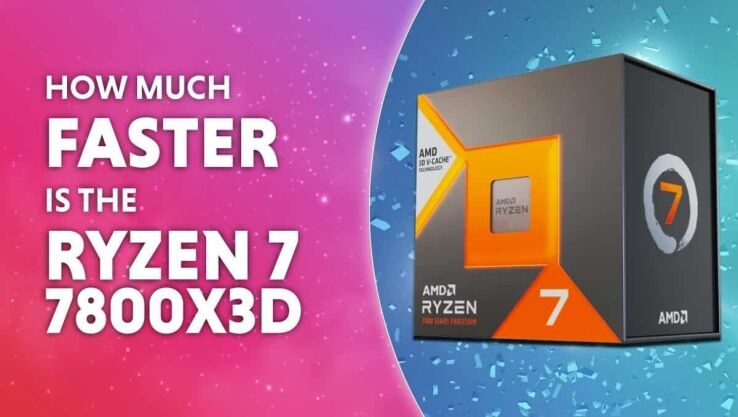How much faster is the Ryzen 7 7800X3D?
How much faster is the Ryzen 7 7800X3D? Let's find out

WePC is reader-supported. When you buy through links on our site, we may earn an affiliate commission. Prices subject to change. Learn more
The Ryzen 7 7800X3D’s release has been long-awaited. The processor will be hitting the markets on April 6th, and it will feature AMD’s powerful 3D V-cache technology. Today, we’re finding out: How much faster is the Ryzen 7 7800X3D?
Now Read: Best CPU for gaming 2023.
We’ll be putting it up against comparable processors, namely its predecessor, the Ryzen 7 5800X3D, and its non-3D counterpart, the Ryzen 7 7700X.
The Ryzen 7 7800X3D
But first, a little more about the future Ryzen 7 processor. The 7800X3D has the following specs:
- Core count: 8 (Multithreading enabled)
- Thread count: 16
- Boost clock: 5GHz
- L2 cache: 8MB – 1MB per core
- L3 cache: 96 MB – shared
- TDP: 120 watts
- iGPU: Radeon Graphics
- Socket: AM5
Of course, what really stands out here is the 96MB of L3 cache. To bring everyone up to speed, cache is high-speed memory located right next to the cores on the CPU die.
More cache equals more information stored locally, meaning the slowly-responding DRAM has to be accessed less frequently.
96MB of L3 cache is way above average. By comparison, the Core i9-13900K has a 32MB L3 cache, whereas the Ryzen 9 7950X has a 64MB L3 cache. The Intel Core i7-13700K has a 30MB L3 cache.
Such a large cache size on the 7800X3D is made possible by AMD’s 3D V-cache technology, which allows the vertical stacking of an additional L3 cache unit on top of an existing one.
How much faster is the Ryzen 7 7800X3D?
We’ll be comparing the Ryzen 7 7800X3D to two processors: the Ryzen 7 5800X3D and the Ryzen 7 7700X.
Compared to the Ryzen 7 5800X3D
The 5800X3D is the predecessor to the 7800X3D. Both processors have the same 8-core, 16-thread CPU setup, and a similar 96MB L3 cache size.
The major difference is the 7800X3D’s higher clock speed – A 5GHz max compared to the 5800X3D’s 4.5GHz max.
The 7800X3D is also built on the newer Zen 4 architecture, which allows it a 14% average IPC (Instructions per clock) increase over the Zen 3 5800X3D. The two of these factors combined afford the 7800X3D a considerable improvement in both single-threaded and multi-threaded performance.
The 7800X3D isn’t out yet, so we don’t have the most comprehensive benchmark stats available for it. Based on the ones AMD revealed to us at CES 2023, the 7800X3D outperforms the already very competent 5800X3D by a margin of 10 to 22% in gaming.
We expect this margin to be even higher in workstation productivity due to the previously mentioned differences in clock speeds and IPC.
You can learn more with our dedicated Ryzen 7 7800X3D vs. Ryzen 7 5800X3D comparison article.
Compared to the Ryzen 7 7700X
The Ryzen 7 7700X is considered the “non-3D” variant of the 7800X3D. You would think that it would be Ryzen 7 7800X. However, such a processor doesn’t exist. The 7700X is the closest we have.
Both the 7700X and 7800X3D are 8-core, 16-thread CPUs. The 7700X has a 5.4GHz maximum clock speed compared to the 7800X3D’s limited 5GHz, but it also only has a 32MB cache size vs. the 7800X3D’s 96MB.
The 7700X outperforms the 7800X3D in raw single-threaded and multithreaded workloads due to its higher clock speeds. However, in gaming and workloads where the cache is a performance-influencing factor, the 7800X3D offers considerably greater performance.
The 7800X3D is the better processor overall.
Final word
Compared to the lesser generations of both X and X3D variants, you can see that the 7800X3D is quite a powerful CPU.
It does lose a litter performance when compared to the current generation in multi-core workloads. This is thanks to the limitations placed upon it via the 3D V-cache. However, it’s not as drastic as it could have been, thanks to the 7800X3D’s dual CCD design.
The 7800X3D should be a serious contender for your next CPU upgrade. It’ll pair well with the latest GPUs and memory technology.